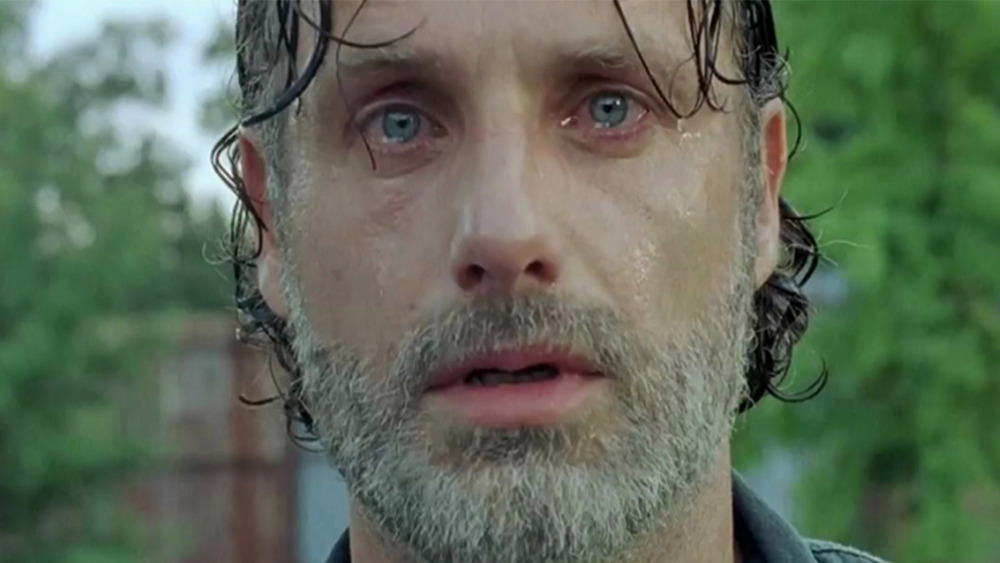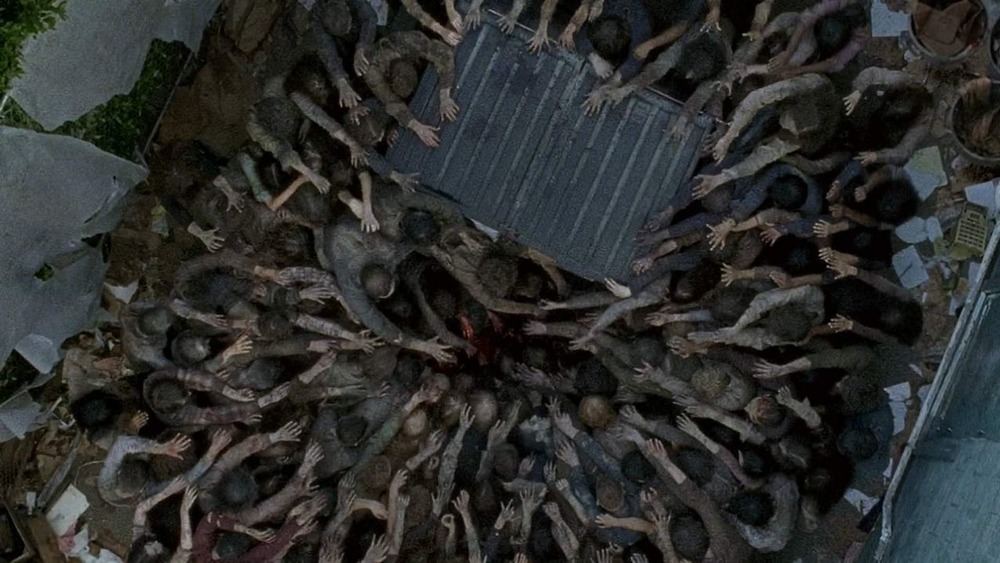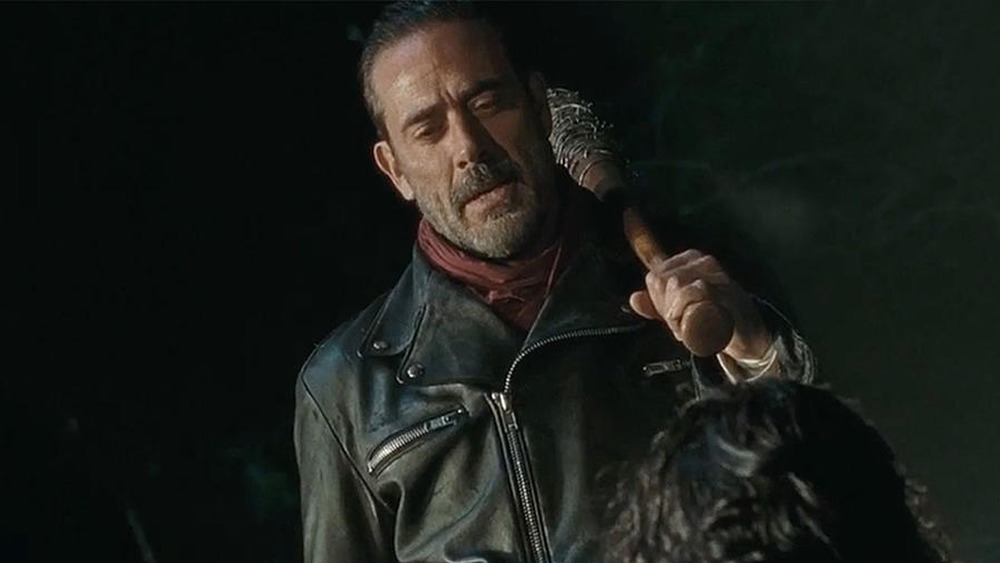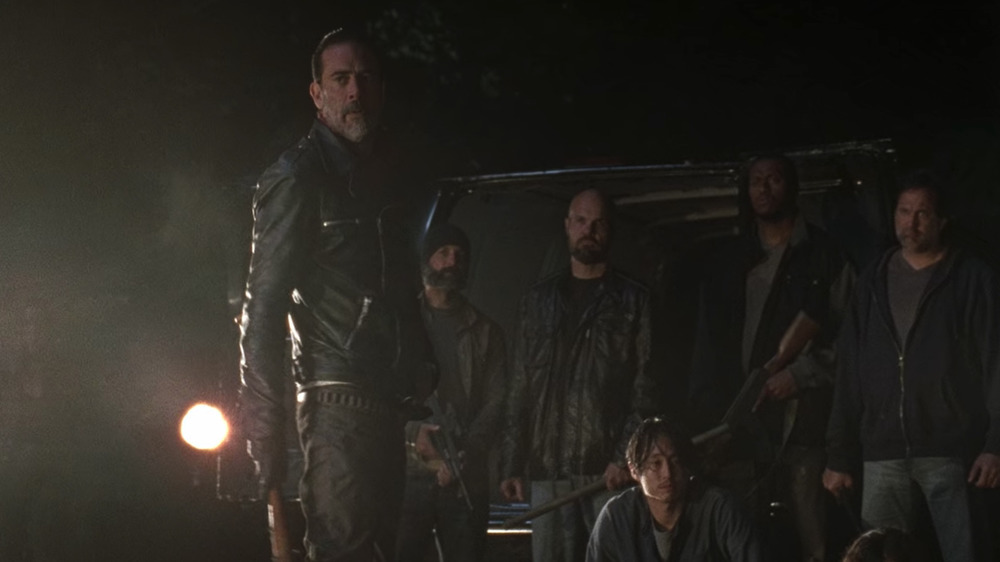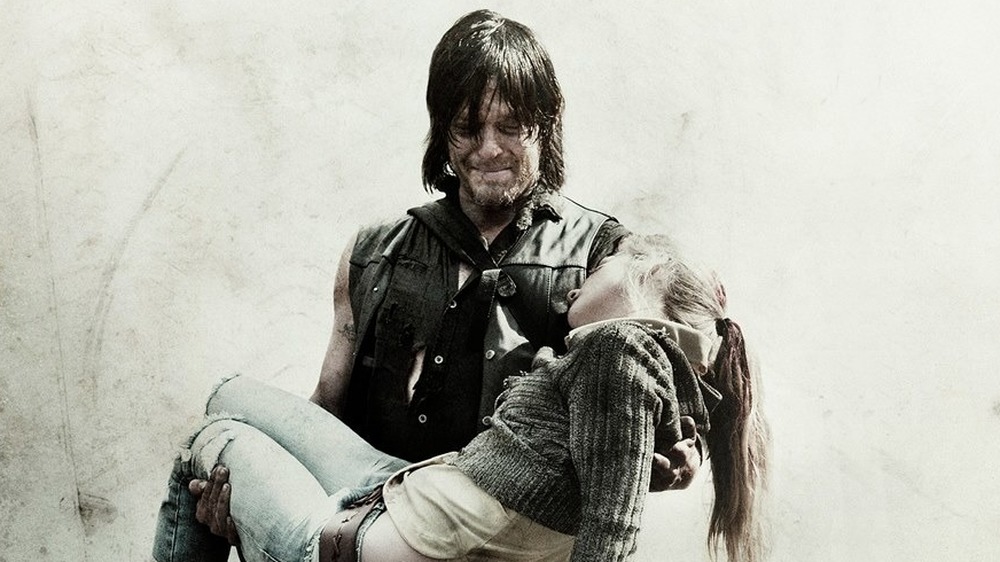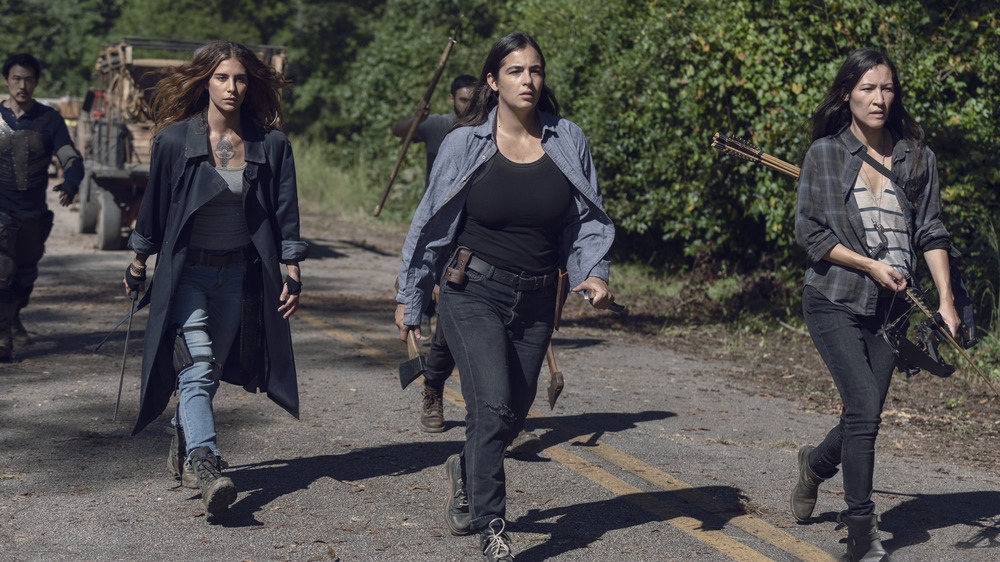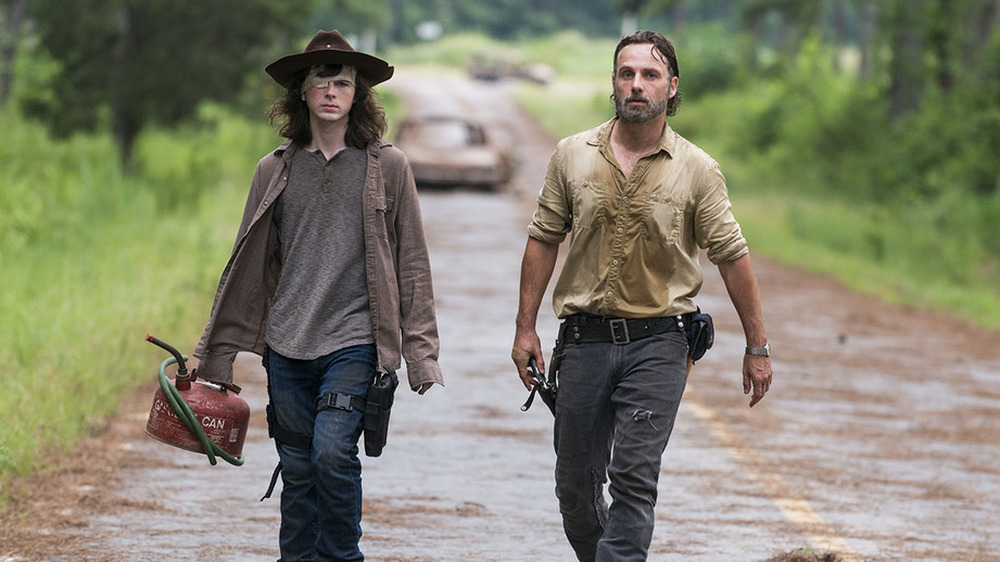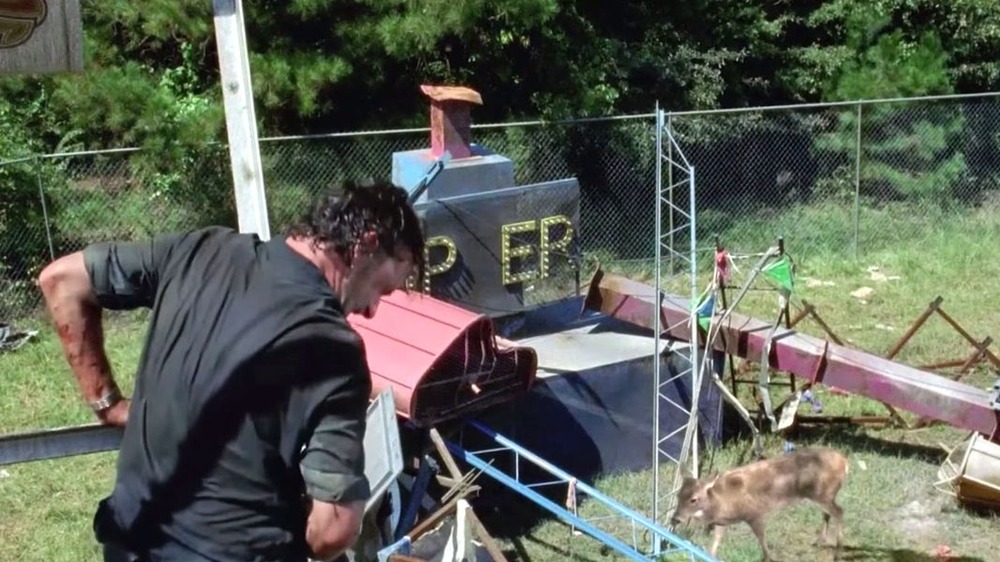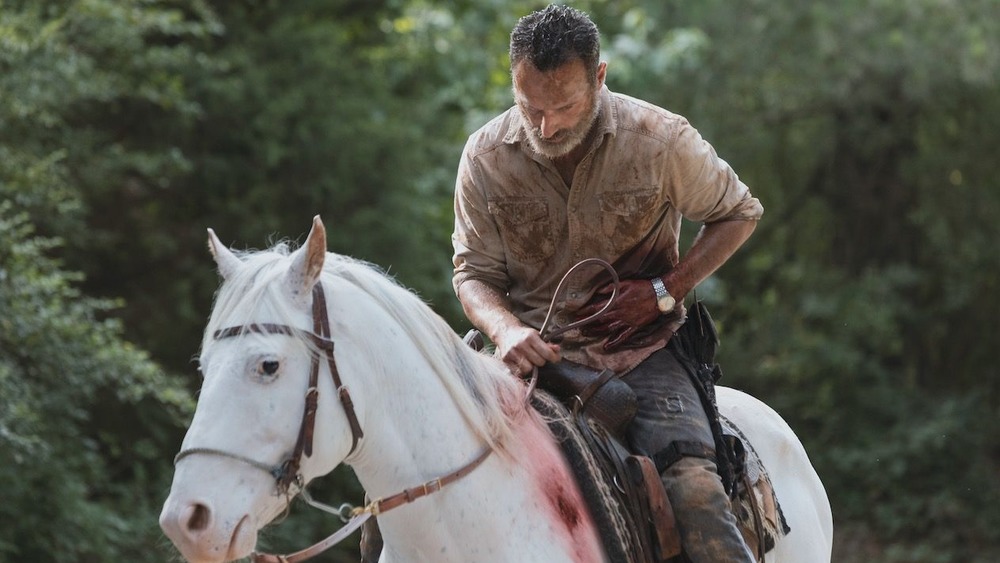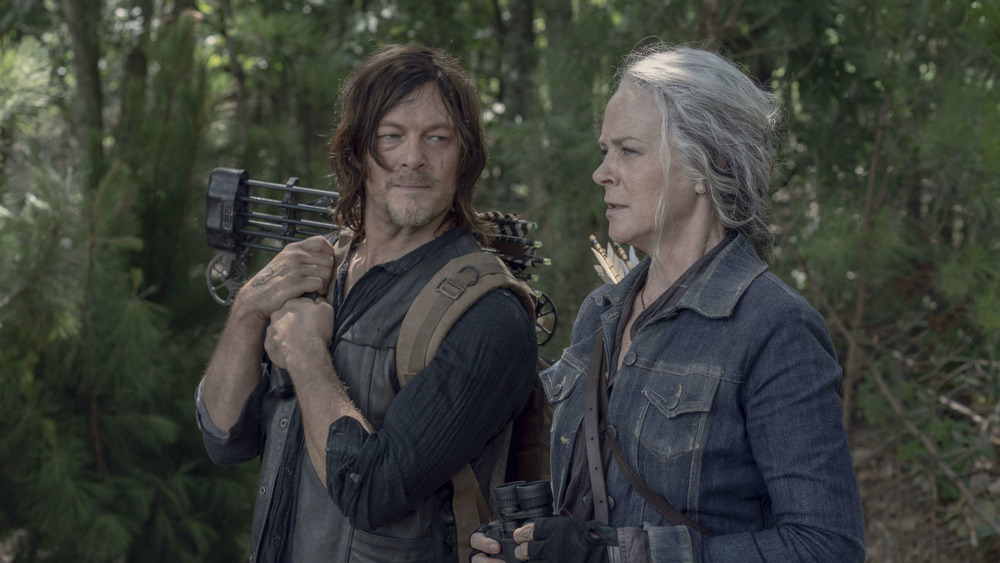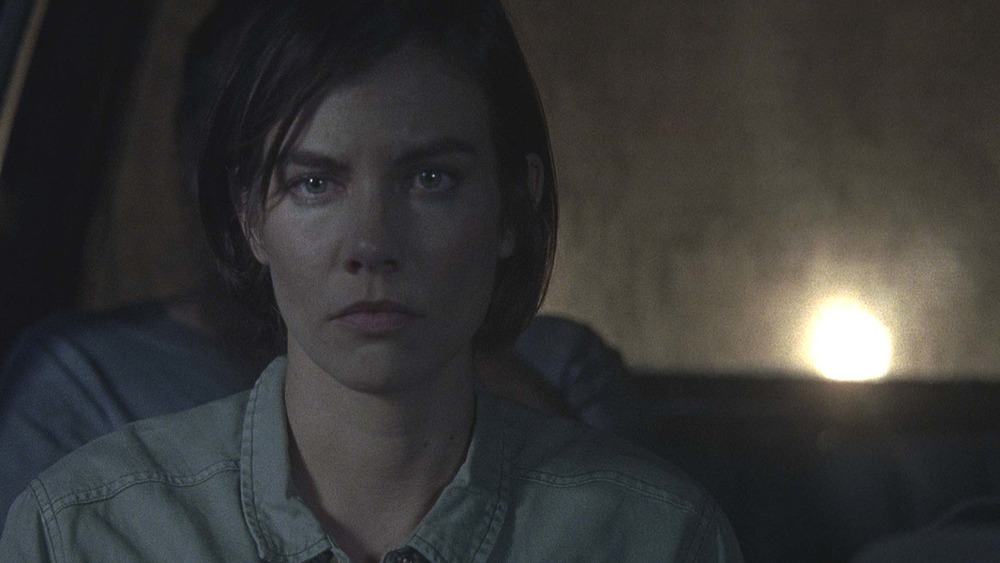The Walking Dead Moments That Outraged Fans
It's no secret that AMC's The Walking Dead has many passionate fans. How else could it have stayed on the air for more than 10 years, after all? Still, as the cast and crew of any show as wildly popular as this one know, an avid fan base can be both an extraordinary blessing and a bit of a curse.
Throughout The Walking Dead's impressively long tenure, there have been plenty of controversial episodes, plots, and even special effects that have angered fans and caused impassioned outcries. Above all else, the most reliable source of fan outrage has been killing off beloved characters. While nearly every death on the show takes its own emotional toll, certain deaths spur upset on a grander and more intense scale. Fans had particularly difficult times saying goodbye to Glenn Rhee (Steven Yeun), Carl (Chandler Riggs), and Tara (Alanna Masterson) when their lives were cut short. While it wouldn't be The Walking Dead without a whole lot of shocking violence, given the universe's harrowing and dangerous world, fans criticize what they see as unnecessary and dramatically unjustified deaths, and also the way certain deaths are portrayed on screen. The Walking Dead's fans have also taken writers to task for plot holes and story developments they don't think make sense, as well as things like bad CGI.
With all that in mind, here are 10 of the most controversial moments on The Walking Dead that sent fans into spirals of outrage.
Glenn's fake death, AKA dumpstergate
Season six of The Walking Dead is chock-full of moments that made its loyal fans irate. But few episodes outraged fans more than "Thank You," the season's third episode. Towards the end of the installment, fan-favorite character Glenn Rhee (Steven Yeun) finds himself trapped in an alleyway with Nicholas (Michael Traynor) with a horde of walkers headed their way. The two men climb onto a dumpster to avoid the ravening dead. Rather than attempt to fight the walkers off, however, Nicholas opts to end his own life, and ends up pulling Glenn down with him into the mass of walkers beside the dumpster. When the camera zooms to capture the crowd, viewers see a body being torn apart, but are unable to confirm whether the body belongs to Glenn or Nicholas.
Many viewers watched "Thank You" and assumed Glenn was a goner. However, some fans correctly predicted Glenn's supposed death was a fake-out. In the end, writers made fans wait three more episodes to reveal that Glenn made it out by hiding underneath the dumpster.
Fans were not only angered by being forced to wait several episodes to learn that Glenn was alive, they were also irked by the improbability of him surviving such an event. Since the walkers often infect humans by biting exposed flesh, it makes little sense that Glenn could have crawled to safety without getting bitten, with little more than a t-shirt for protection.
Season six's giant cliffhanger episode
Season six's season finale, "Last Day on Earth," quickly became one of the most talked-about episodes of The Walking Dead – and not for good reasons. Previous episodes see our heroes endure escalating conflict with another sect of survivors called the Saviors. In the last few minutes of "Last Day on Earth," Jeffrey Dean Morgan is finally introduced as Negan, the group's leader. Negan captures Rick, Michonne, Glenn, Maggie, and others, and brutally kills one of the group with his baseball bat. This climactic scene is filmed from the point of view of the victim, however, so it isn't apparent to viewers who has died.
"Last Day on Earth" was savaged by critics for its uneven pacing and what many see as an overly dramatic ending. Some outlets like Vox even called the episode "dirt-stupid" and declared it "the worst episode the show has ever done." The episode was not only criticized by professional pundits: Avid fans and viewers also voiced their disdain for the frustrating episode.
The backlash was so bad that showrunner Scott M. Gimple had to speak to reporters. He attempted to assuage fan anger and assure them that The Walking Dead had a solid story ready to go for the seventh season. The anticipation built in the months between "Last Day on Earth" and the reveal would be worth it, he argued. Whether or not fans have ended up agreeing is another story.
Glenn's gut-wrenching death
When viewers tuned into season seven's premiere episode, "The Day Will Come When You Won't Be," they were hanging on the furthest edge of their seats, eager to see who Negan killed at the end of the controversial sixth season finale. Unfortunately for The Walking Dead's showrunner and writers, however, "The Day Will Come" created just as much backlash among viewers and fans as its much-debated predecessor. The episode starts by revealing that Negan killed Abraham with his baseball bat at the end of "Last Day on Earth," as Rick and the rest of his friends watched in abject horror. In response, Daryl punches Negan. Negan punishes the group for this rebellion by brutally killing Glenn with the bat.
Not only was Glenn's death criticized for playing up the gore and adding little to the series, it was also pointed out that his death via baseball bat eerily mirrors the murder of Vincent Chin. Chin was a Chinese-American man who was brutally beaten to death in Michigan in 1982.
Some critics were so incensed by this that they straight-up quit watching the show after "The Day Will Come When You Won't Be" aired — as did many fans. To say that Glenn was a fan-favorite character would be a massive understatement, so his death would've caused outcry regardless of how it happened. But the exceptionally grotesque way it is portrayed proved to be simply too much for many Walking Dead watchers.
When the show's Facebook page spoiled a huge character death
The Walking Dead's earlier seasons aired in the super-heated beginning of our current "no-spoilers" era of television, where accidentally revealing an episode's plot to a friend or coworker is considered a social crime of the highest degree. So, fans were unsurprisingly outraged when the events of "Coda," season five's mid-season finale, were spoiled. But the cat wasn't let out of the bag by an overzealous critic or viewer. No — this time, The Walking Dead was spoiled by its own staff.
In this episode, Maggie's sister Beth is killed mere moments before the two are supposed to reunite. To add further emotional injury, Daryl tragically carries Beth's body just as Maggie gets to the hospital. AMC's social media team posted a photo of this scene on The Walking Dead's official Facebook page shortly after the episode aired on the East Coast, effectively spoiling the entire episode for everyone still waiting for it to air in different time zones. Had the leak been a little more ambiguous as to Beth's fate, it might've been excused. But the photo used leaves little to the imagination ... and is also captioned "RIP Beth."
Fans were understandably upset, and the photo garnered thousands of angry comments, including calls for AMC to fire the social media manager who spoiled "Coda" for thousands of viewers.
The show's pesky habit of burying its gays
By now, fans of The Walking Dead know that no character is ever fully safe in the show's universe. It doesn't mean the deaths of fan-favorite characters don't hurt, however — and some deaths sting more than others. It can be especially painful to watch an LGBTQ+ character die, as there aren't a whole lot of them on TV. When a work of media kills off LGBTQ+ characters excessively, it's often referred to as "burying your gays." The trope is not exclusive to The Walking Dead, but critics have identified the show as one of the trope's worst offenders.
Denise's (Merritt Wever) death in the middle of season six frustrated viewers for these reasons. The deaths of Tara (Alanna Masterson) and Jesus (Tom Payne) during season nine were the last straw for many. Defenders of The Walking Dead argue that the show introduced new LGBTQ+ characters that season, but critics counter that swapping out one set of LGBTQ+ characters for another is just as bad as simply killing them off.
These character deaths aren't the only times that the Walking Dead's portrayal of LGBTQ+ relationships has caused controversy, albeit for very different reasons. When Eric and Aaron shared the series' first gay kiss back in season five, it was a win for LGBTQ+ representation on the show and TV. However, some viewers responded to the touching scene by angrily tweeting homophobic comments and slurs.
When the show revealed one of its most beloved characters had been bitten
As far as father-son duos go, Rick and Carl Grimes' relationship has definitely been tested over the years. By season eight, the two are among only a handful of characters who have been on the show since its beginning. Fans watch Carl grow up, both literally and figuratively, over the course of the series: As he gets taller, he also goes from being a timid boy to a strong and empathetic young man.
Though fans of The Walking Dead know that no characters are completely off-limits when it comes to death, killing off Carl after developing his character so thoroughly seemed a bit far-fetched to many viewers. But that's exactly what happens when Carl reveals that he'd been bitten by a walker in season eight's mid-season finale. The circumstances of how Carl was bitten makes it all the more tragic: He was overwhelmed by walkers while selflessly saving Siddiq and bringing him to Alexandria.
Fans were enormously upset by the news that Carl had been bitten, and some tried frantically to come up with theories as to how Carl might possibly survive. Unfortunately, the show put those theories to rest: Carl ultimately chooses to take his own life and eliminate the risk of re-animation. The fans weren't the only ones upset about Carl's death either, as it happens — even the cast was distraught over this particular loss.
Fans roasted the show for its obviously fake CGI deer
Character deaths aren't the only reason why The Walking Dead fans have critiqued the show over the years. While the bloody series is known for portraying hyper-realistic violence and eerily convincing zombies, there is one special effect that didn't live up to audiences' standards.
Season seven's 12th episode, "Say Yes," largely focuses on exploring the relationship between Rick and Michonne. While the two characters fend off walkers and search an abandoned fairground for food and supplies, Rick spots a live deer. Since Michonne had previously been forced to surrender a deer to the Saviors, Rick attempts to kill the deer for Michonne to settle their debt, but ends up falling into a horde of walkers after his high vantage point collapses.
This premise of Rick trying to square things with Michonne is reasonable enough. But the shots of the CGI deer that ended up in the show are so obviously fake that fans were flabbergasted as to how they made it into the final cut. To be fair, shooting a real deer would've been next to impossible in such an environment, since deer basically never stand still, but the CGI stand-in the show uses really is comically bad. If the showrunners were hoping the special effects in this episode would leave a lasting impression, they definitely did ... just not in the way that they were probably hoping for.
Rick's fake-out death
Despite the deaths that often come to beloved Walking Dead characters, it was, for a long time, generally understood that writers wouldn't kill off the face of the series, Rick Grimes. That's why viewers were shocked when AMC announced that season nine's fifth episode, "What Comes After," would be Grimes' final episode of the show. Typically, people in The Walking Dead's universe don't just leave or move away: A final episode usually indicates that a character is about to die. So when Rick explodes a bridge to save the survivors from a horde of walkers, everyone assumed this sacrifice would be his last. After all, fans had been explicitly warned.
Alas, AMC wasn't done with Rick Grimes just yet. He's found alive at the end of the episode and taken by a mysterious helicopter that isn't explained until the next season. Moreover, actor Andrew Lincoln was later announced to be starring as Rick in The Walking Dead films.
Understandably, some fans thought the fake-out was a cheap ploy for drama that saps the emotional weight of Rick's sacrifice. Others thought the narrative device was fine the first time the show used it, but that it quickly grew stale from overuse. But the time Rick gets his own pseudo-death, the show had employed the manipulative trope far, far too many times before. At some point, fans just aren't going to be shocked anymore.
When season 10's finale was postponed
While fans have often been eager to voice their opinions about The Walking Dead's writing and special effects, they've sometimes given the showrunners a hard time about conditions and elements that are simply out of anyone's control. Case in point: The show's 10th season began airing back in 2019, but post-production delays during the onset of the COVID-19 pandemic in spring 2020 meant that fans had to wait until early 2021 for season 10's conclusion. Many viewers were upset about being forced to wait almost a full year to see the conclusion of so many storylines and character arcs. But most fans understood that this was a necessary measure AMC had to take to protect its staff.
Another point of contention for fans was that the unpredictable nature of the entertainment industry's COVID-19 shutdowns made it impossible to predict when fans could expect to watch season 10's final episodes. Season 10's delays also meant that season 11 had to be pushed back, with the latter season gaining significantly more weight and importance once AMC announced it would be the show's last.
Thankfully, the intended season 10 finale eventually aired in October, and AMC added six additional episodes to the run to placate long-suffering fans. Still, few viewers will forget how long they had to wait. It's one of the more trivial frustrations of the COVID-19 crisis, granted, but it's a frustration nonetheless.
When the main characters shifted alliances in the season eight finale
Few episodes were as divisive for The Walking Dead's fan community as the season eight finale, "Wrath." In the episode, the conflict between Rick's alliance and Negan's Saviors finally comes to a head, and Rick is able to overpower Negan in a dramatic showdown. Since Negan has caused so much pain and killed several members of Rick's post-apocalyptic family, both viewers and survivors expected Rick to take retribution and kill Negan on the spot. However, Rick and Michonne decide to have mercy on Negan and take him as a prisoner. This causes Maggie to snap.
Blood-thirsty fans were with her. They felt as though they were robbed of a more satisfying ending to the war with the Saviors, while others felt that the complete 180 Rick takes to save Negan's life after slashing his neck doesn't make sense, even if Carl wanted him to live a more merciful life.
The episode clearly sets a new tone for season nine, and heavily insinuates that Maggie, Daryl, and Jesus will serve as antagonists to Rick and Michonne. While fans generally understood why Daryl and Maggie would find Rick's mercy for Negan unacceptable (Negan gruesomely killed the father of Maggie's child right in front of her, after all), some were confused as to why the more pacifist-minded Jesus sided with them.
